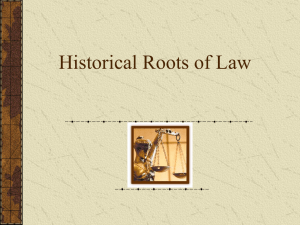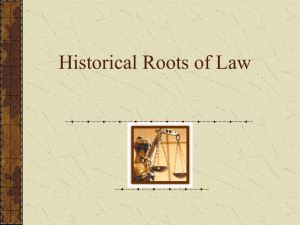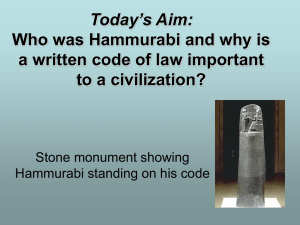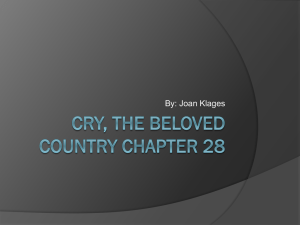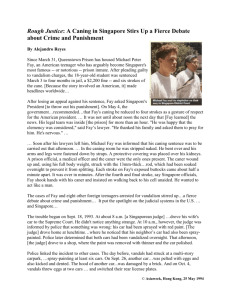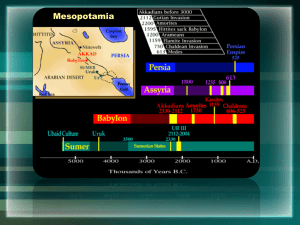Unit One-Our Legal Heritage 6156KB Sep 06 2013 03:18:48 PM
advertisement
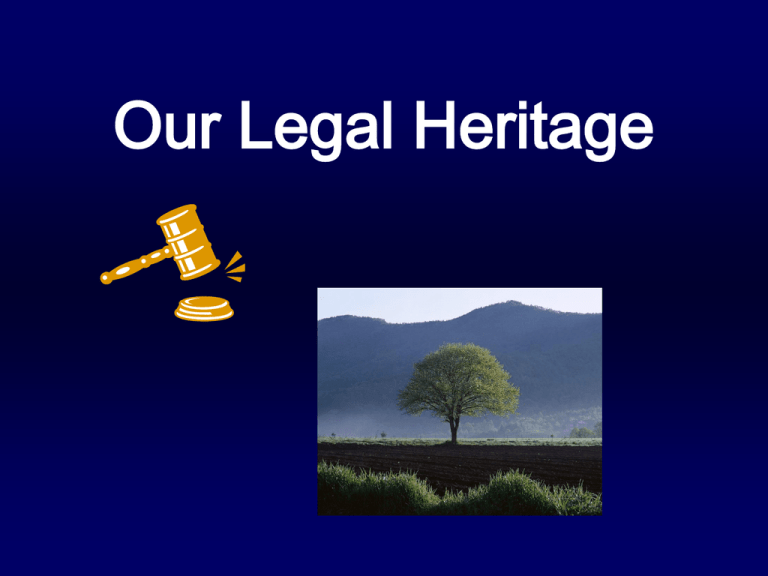
Our Legal Heritage Record Studying Law What is the punishment for murder? • No “blanket” punishment- depends on several factors Studying law will require you to look at 2 sides of an issue even if you only want to look or listen to one. You need to have an open mind. Try not to rely on your morals, simply focus on what the law has to say about the problem. - What actually happened? - Who are the key participants in the case? - What laws are involved? - What is the argument? What law(s) can you think of that might apply to this construction site? What law(s) can you think of that might apply to rollerblading in the park? What law(s) can you think of that might apply to this traffic scene? Terms Justice: fairness; judgment by legal process Injustice: a lack of fairness; to judge a person unfairly Can you think of an example of an injustice? True or False? “All dogs are animals, but all animals are not dogs.” “All laws are rules, but all rules are not laws.” * Students are to read “Rules versus Laws” on the bottom of page 10 and the bottom of page 11 “What is Law?” Which are RULES and which are LAWS? 1. No Smoking on school property. - Was a rule, now a law! 2. Getting your homework in on time. - Rule 3. Wearing your seatbelt in the car. - Law: it can be enforced 4. Not being permitted to purchase cigarettes under the age of 19. 5. Not wearing hats in class. - Rule 6. No hunting deer without a license. - Law; you can be fined for doing otherwise 7. Putting your garbage in the container at the bus stop. -Law (littering) 8. No fortune telling for money. -Law: municipal 9. Turning off your cell phone at the movies. - Rule 10. No swearing at your teachers -Generally a rule, BUT if public profanity is prohibited within the community, the courts will enforce this law. However, if any comments defame the character of the teacher, the teacher can sue for slander. Sixteen-year-old Canadians cannot vote, but they must obey the laws of the country, even if they may not agree with them. Turn to page 12 in your text. Look at the photo. Record any laws which apply to this traffic scene. Answers: • • • • • • No stopping in the left lane No parking in the right lane No stopping between 7am and 9am on weekdays No stopping within 9 meters of the crosswalk No driving into a one way street Cyclists must obey traffic laws (Notes) The Need for Law Laws allow us to live in a peaceful and safe society. Laws protect us from violence. The courts provide a place for disputes to be settled with structure and safety; not in the streets. Some societies enforce law through intimidation and citizens can be imprisoned without a trial. Homework Write a response to the following question (minimum ½ page) • What is the meaning and function of law in Canadian society? • Why do all societies need laws? Location of Singapore Some interesting facts about Singapore • Singapore consists only of one main island and 63 other tiny islands. Most of these islands are uninhabited. • Singapore is among the 20 smallest countries in the world, with a total land area of only 682.7 square kilometers. The USA is about 15,000 times bigger. • Apart from Monaco, Singapore is the most densely populated country in the world, with 6,430 people per square kilometer. Learning about Singapore • Silently read the text on “Laws in Southeast Asia”. • Record 5 or more “pieces of thinking”! • Read the story of Michael Fay and compete assignment. Some more thoughts to explore… • For what reason do you think Michael Fay vandalized property? • What do you know about cars in Singapore? They are very expensive! They will cost you about $70,000 CDN dollars for a tiny subcompact car. A mid-sized car in the US that you could buy for $12, 700 CDN would cost $100,000 in Singapore. Vandalizing people’s cars is equivalent to breaking into someone’s home and damaging it. People in Singapore work years to be able to buy a car and/or pay it off. Therefore, this type of vandalism shows an extraordinary lack of respect. • Was it right for the US to lobby for a lesser sentence for Michael Fay? Michael Fay’s friend from Singapore received the full sentence. Was this fair? • Lastly, some people in the US complained that caning was inhumane treatment, yet the US still practices the death penalty in several states- is this a case of the pot calling the kettle black? Rule of Law There are three parts to this principle of justice. 1) Individuals must recognize and accept that laws are necessary to regulate society. 2) It means that the law applies equally to everyone; no exceptions! 3) No one in our society has the right to exercise unrestricted power on their own. It must be done through the courts and in accordance with the law. Which scenarios follow the Rule of Law? • An off-duty police officer is not charged by a fellow officer for speeding. • The premier is charged for assault after pushing a protester out of the way. • A local politician gets his or her lawn cut by the parks and recreation department staff. Roncarelli v. Duplessis (1959) (read p.13) 1. Explain which aspect of the Rule of Law Duplessis violated. 2. If the court had found in favour of Duplessis, what might the public have thought of our justice system regarding the Rule of Law? Might this have had an impact as to how people conduct themselves? “MacIsaac Discharged for Fiddling with Pot” (page 16) 1. • What was the charge against Ashley MacIsaac? Possession of Marijuana (under the Controlled Drugs and Substances Act) 2. • What was Ashley’s punishment? None. He received an absolute discharge. 3. What do you think about the judge’s decision? Was justice served? Connect this to the Rule of Law. It would only be fair or just treatment if other people possessing marijuana as Ashley did, received the same treatment. We know that this was not the case. The judge did not abide by the Rule of Law principle that everyone should be treated equally for like cases. He also abused his own power by “letting him off the hook” just because of who Ashley is. • Knowing what is right: Doing what is wrong? • Group Activity (groups of 3) Law and Morality Not all people will agree on laws. Some laws conflict with our morals. Regardless of a person’s opinion of the law, they are to abide by it or face arrest if they are caught breaking it. Example: I may have a friend suffering from a terminal illness and he/she may want me to help him/her die. Although I understand the struggle and motives of my friend, assisted suicide is against the law and if I get caught “helping” my friend, I may face murder charges. How our Morals Shape Laws It is the job of politicians to create and amend (change) laws. Politicians are to listen to the people they represent and later voice the concerns of the people when they meet. Laws created reflect the wants, needs and morals of people at the time. For example, people write letters, phone their MLA, hold protests or sign petitions to get the attention of their local politician so that he/she can present the matter at a Town Council meeting/Province House/Parliament. All politicians representing the area discuss the concerns brought forth. These discussions may result in laws being created or changed. A matter of morals… 1. "Your spouse has become nervous wreck since she began day trading on the Internet. But she made $10K in a month. Do you make her stop?” 2. "The teacher asks if you wrote your son's book report. Your son claimed he did it but the teacher's right. Do you admit it?” 3. "You've sold your house. Before you move out, the roof starts to leak. Do you have it fixed?” 4. Your fiance gives you a new video camera as a gift. When you agree to break off the engagement you're asked to return the camera. Do you? A matter of morals… Write the numbers 1-4 on your paper. Answer each question by writing YES, No, or DEPENDS. 1. "Your spouse has become nervous wreck since she began day trading on the Internet. But she made $10K in a month. Do you make her stop?“ YES: 48% DEPENDS: 35% NO: 17% 2. "The teacher asks if you wrote your son's book report. Your son claimed he did it but the teacher's right. Do you admit it?" NO: 67% YES: 23% DEPENDS: 10% 3. "You've sold your house. Before you move out, the roof starts to leak. Do you have it fixed?“ YES: 34% NO: 33% DEPENDS: 33% 4. Your fiance gives you a new video camera as a gift. When you agree to break off the engagement you're asked to return the camera. Do you? NO: 78% DEPENDS: 13% YES: 9% Case: R. v. Dudley and Stevens (1884) (Page 15) Analysis: 1. What does this tell you about law and the morals and values of the people in England during this period? It is obvious that the people of England and their moral values were different from that of the law. Perhaps if the sailors were treated to imprisonment rather than killed, society might not have disagreed with the law as much. 2. What would your verdict in the case be? Why? 3. Can the actions of the sailors be justified? Explain. Actions justified because… -no other alternative existed - to abide by the law was impossible because all three sailors would have died. They were saving their own lives. Actions not justified because… -intentionally killing another person is a crime- the law must be applied equally to all people - we do not have proof that there were no other alternatives available to sustain their lives Would you prefer to be treated EQUALLY or FAIRLY? Discussion Questions to Ponder… • Would it be fair to treat all students the same regardless of their learning abilities? What might happen if we did? • Is it fair to treat physically able people the same as those with physical disabilities all the time? How could this idea put some people at a disadvantage? Law and Justice Most Canadians believe that justice means equality. This means that all people will be treated equally. But there are some cases where circumstances must be taken into consideration so that a person is treated justly or fairly. To be treated fairly, one must: a) Carefully evaluate the circumstances of the problem and the person who is accused of wrong doing. b) Not discriminate against another person on the basis of irrelevant characteristics regarding skin colour, religion,etc. c) Apply the law regardless of position of financial status. Fair does not mean equal. Agree or disagree? Provide an example to support your thinking. History of Law Law and Civilizations • Laws in the form of community enforced rules have existed since people began to interact. • Most were based on common sense and passed on by word of mouth. • As populations grew and laws became more complex, the need to record laws in writing increased. For your information… B.C.E. • "Before common era." This abbreviation has come to replace the previously used B.C. ("before Christ"), and covers the period of history prior to the birth of Christ. C.E. • C.E.: "Common era." This abbreviation came to replace the previously used A.D. (anno Domini, Latin for "in the year of the Lord") because of new knowledge regarding the date of the Christ's birth. The common era covers the time from Christ's birth to the present day. Code of Hammurabi (1792-1750 BCE) • One of the earliest known sets of recorded laws, written by King Hammurabi of Babylon • He codified, or recorded, the rules and penalties of every aspect of Babylonian life. Code of Hammurabi • Laws reflected a patriarchal, male-dominated society • Higher members of society would be punished, however women or slaves actually receive retribution • No distinction was made between an accident and a deliberate action. Code of Hammurabi • Many of the laws were based on RETRIBUTION- an eye for an eye type of justice • Other laws focused on restitution, meaning a compensation payment would be made to the victim. An Eye for an Eye Many of the ancient laws were based on an “eye for an eye” philosophy to ensure that justice was done and that no vengeance was exacted by the parties who had been wronged. Which of the following laws reflect this philosophy? • If a man knocks out the teeth of his equal, his teeth shall be knocked out. • If a builder builds a house for someone, and does not construct it properly, and the house which he built falls and kills it owner, that that builder shall be put to death. • If anyone hires oxen, and kills them by bad treatment or blows, he shall compensate the owner, oxen for oxen. • If anyone is committing a robbery and is caught, then he shall be put to death. Mosaic Law (1250 BCE) • One of the greatest influences of modern law in Canada in biblical law • Also known as Hebrew Law or Mosaic law, these laws are often referred to as the Ten Commandments • Recorded in the Book of Exodus Mosaic Law (1250 BCE) • Basic principles are similar to the Code of Hammurabi yet the laws had evolved • Law was more concerned with punishing deliberate actions instead of accidental acts of harm • Punishment focused on the offender and not someone of lesser status Do you know the Ten Commandments? • Video The Ten Commandments Challenge • The Ten Commandments Law Connection Test Greek Law (400 BCE) • First form of democracy was born in Greece • Greek law promoted citizen involvement in running the country • Voting and Jury Duty were both major responsibilities for citizens • Sentencing was also democratic Roman Law (450 – 100 BCE) There were two basic principles to Roman Law: 1) The Law must be recorded 2) Justice could not be left in the hands of judges alone to interpret • Roman laws were codified and could be revised when necessary • The Twelve Tablets dictated the law of England and is considered the foundation of modern law • The practice of having a legal advisor who specializes in law first occurred The Twelve Tablets Promoted: • Public Prosecution of Crimes • A system of victim compensation • Protected the lower classes from the ruling classes Women, however, were not mentioned as they were not considered persons! Justinian’s Code (527- 565 CE) • Byzantine Emperor Justinian I commissioned the clarification and organization of Roman Law • A new body was completed in addition. This was called Justinian’s Code. • It formed the basis for civil law. • The word “justice” comes from his name. Napoleonic Code (1804) • The Napoleonic Code’s non-technical style made laws accessible to the public • Also known as the French Civil Law • Regulated Civil matters such as property, wills, contracts, and family law. Key Vocabulary Codified: Laws which are arranged and recorded systematically Retribution: Justice based on vengeance and punishment Restitution: Payment made by the offender to the victim of a crime. Historical Roots of Law Laws have existed for many years. Laws have changed as society has changed. Some laws have become more complex and some have even been eliminated. By reading about the past, you will discover the impact the past has had on Canada’s present legal system. Read pages 17-23 and answer the following questions. 1. What were the Great Laws of Manu? 2. Identify one of the earliest-known written legal codes. 3. The text states the many of Hammurabi’s laws were based on retribution. What does this mean? 4. What does the term restitution mean? Give an example to support your definition. 5. Name the set of laws found in the book of Exodus in the Bible. 6. Which society had the first paid legal advisors? 7. How did the Justinian and Napoleonic Codes contribute to the development of modern law? In medieval Europe and England, people were very religious. Everyone assumed that God would protect people from harm. So, when a legal case was hard to decide, the judge would sometimes order a new trial to be "decided" by God. Way Back When… Trial by ordeal: This “trial” required a person to undergo torture to determine guilt or innocence. Example:Trial by fire (hot iron) Trial by water (If the accused sank, the verdict was innocent, but the accused often drowned before being rescued. An accused person who floated on the water was pronounced guilty because water was considered a symbol of purity that had rejected the accused.) Trial by Oath Helping: (often used for less serious offences) This required friends of the accused to swear on the Bible indicating that he or she was innocent. If the friend(s) agreed to do it, then the accused was freed. Sound easy? No! People feared that God would punish them if they lied under oath, so they wouldn’t chance telling a lie! Trial by Combat: determining guilt or innocence by having the parties fight a duel. It was thought that God would be on the side of the innocent party and that the innocent man would win. In Canada, extending or accepting a challenge to fight a duel is a criminal offence that carries a penalty of imprisonment for up to two (2) years. Purging by Water (Trial by Ordeal: Page 25) “Unfortunately many innocent people ended up either confessing or dying because of the ordeal.” - Explain. Important Term Habeas Corpus: a court order designed to prevent unlawful arrest by ensuring that anyone detained by police is charged within a reasonable amount of time. Consider This! Adil breaks into a neighbor’s home and steals some goblets and jewellery. Adil blames a friend for the crime. The friend has now been charged with a crime for which he may be put to death. 1. • 2. • If Adil is caught telling lies about his friend, what, according to Babylonian law, will happen to him? Would this behaviour be an offence in Mosiac Law? According to Babylonian law, since the punishment for theft from a neighbor was death, then the punishment for false accusation of theft was also death. According to Mosiac Law, giving false testimony was forbidden, so Adil’s behaviour would be considered an offence in Mosaic Law. The judge who hears the case against Adil’s friend finds him guilty. Later he changes his mind about his verdict. What would happen to this judge according to the Code of Hummurabi? Would the judge be punished in Mosiac Law? The judge would probably be publicly removed from the judge’s bench for life. Under Mosiac Law, an accidental act of harm (mistake in judgment) was not as great as a concern as punishing a deliberate action. Therefore, the judge would not likely be punished for a mistake in judgment. A Dash for Loose Cash: A Question of Ethics! Group #1: A crime is defined as: An act which harms the public welfare and is made unlawful by a government. Was picking up the money a crime? Why in this situation, was the temptation so great, to take the money and run? Group #2: Why did the papers report the average household income in their reports of the story? Why? Also, Are there people who steal whether they are rich or poor? Explain. Group#3: When the news of the Guardian Armoured Truck happening hit the newspapers, a journalist, Susan Ager, wrote about a similar situation which occurred to her and her husband in 1985 while traveling in Peru. Her husband’s money ($25) was scattered all over the street when his pockets were torn by some thieves. That amount of money, in such an impoverished country, could have fed an entire family for a month. But, to Ager’s amazement, the people scrambled to pick up every cent and return it to her husband. She asked this question: “Why were these people so different?” Group #4: Was it wrong for those people to take the money? Discuss it with your group and see if you can’t all agree on an answer to give to the class. This case is an example of WHITE COLLAR crime. Can you guess what white collar crime means? Give another example.
